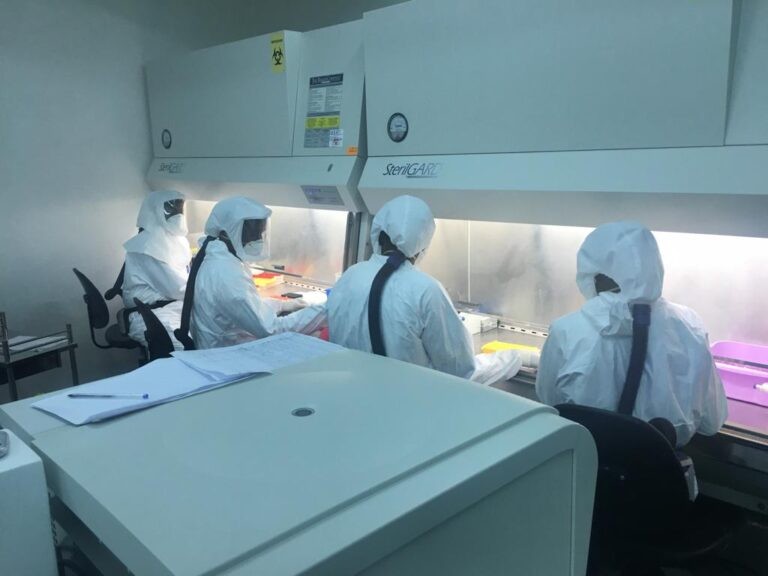New COVID-19 variant reported in Nigeria – Africa CDC
John Nkengasong, director of the Africa Centres for Disease Control and Prevention (CDC), says a new variant of COVID-19 has been reported in Nigeria.
He disclosed this on Thursday at a virtual media briefing to give an update on the COVID-19 situation in Africa.
On December 21, the Africa CDC had issued a statement on a new variant of SARS-CoV-2, the virus that causes COVID-19, which was reported recently in South Africa and the United Kingdom.
The agency had said the variant was first identified in Nelson Mandela Bay and “has rapidly spread through the Eastern and Western Capes, as well as KwaZulu-Natal”.
“This new variant is defined by multiple non-synonymous mutations in the spike (S) protein. Three of these mutations are located on the receptor-binding domain (RBD) of the spike protein – the most notable being the N501Y mutation on the receptor binding motif that binds to the human Angiotensin Converting Enzyme-2 (ACE2) receptor,” the statement reads.
“Preliminary analyses from South Africa and the United Kingdom suggest that this new variant may be associated with increased transmissibility and a higher viral load than the previously circulating variants. However, researchers are conducting further investigations on this new N501Y variant to determine if it is more infectious, more transmissible, or has the potential to cause more severe illness.”
Speaking on Thursday in response to a question on if the new COVID-19 strain discovered in South Africa has spread to other parts of the continent, Nkengasong said although the strains are different, there had been reports of a similar variant detected in Nigeria.
“We should expect that these new variants will continue to emerge for several reasons. First of all, this virus is what we call the RNA virus – these are viruses that are not stable and they tend to replicate and change for their own survival. But the rate of change for these viruses is nothing compared to the influenza virus,” he said.
“In terms of how dangerous this virus is, this is what we know about the virus so far: it transmits quickly which is why it is responsible for a vast majority of the second wave in South Africa; the viral load is higher.
“We still don’t know if it correlates with severe disease or not. Higher viral load doesn’t necessarily mean that it translates to severe disease but it is a correlate that it could potentially lead to severe disease. We don’t know if it has an effect on diagnostics and we don’t believe so, because it had an effect on diagnostics, it wouldn’t have been picked up in the first place.
“On if it’ll have an effect on vaccine deployment and efficacy, because the vaccines are developed using the entire spike proteins, and this is just a mutation, we have to look at the conformational structure, which is the overall protein, and not just those specific mutations. However, research will guide us in the future as to what this means.
“This virus strain is different from the one in the UK. It’s called lineages. The lineages are different; the mutations are similar. And we’re now beginning to hear reports that this same lineage is – the South African lineage is being picked up in the UK. We also know that similar lineages have been reported in Nigeria this week by professor Christian Happi’s group.
“So, I think it is something that is evolving and we’ll continue to track. We don’t know the extent of spread across the continent, but as I indicated, one thing you should be absolutely sure of is that the Africa CDC pathogen genomic institute which was launched last year will go into full swing using the centres of excellences to begin to characterise these viruses and understand the epidemiology.”
‘Detection of SARS-CoV-2 P681H Spike Protein Variant in Nigeria’, published in the ‘Virological’ journal, with the collaboration of the African Centre of Excellence for Genomics of Infectious Diseases (ACEGID); Redeemer’s University, Osun State; the Nigeria Centre for Disease Control (NCDC), and the Africa CDC, draws slight similarities between the variant found in Nigeria and that of the UK, but puts it at less than 2 percent.
“At the moment, only about 1% of the SARS-CoV-2 genomes from Nigeria share any of the 17 protein-altering variants from the UK lineage of concern (B.1.1.7). However, this might change in the next few weeks when we sequence more samples from the recently reported surge of covid-19 in Nigeria,” a summary of the report, which was published on Wednesday, reads.
Nigeria experienced a recent spike in COVID-19 infections within the past week — over 5,000 new cases and 36 deaths were reported within the past seven days. (The Cable)


